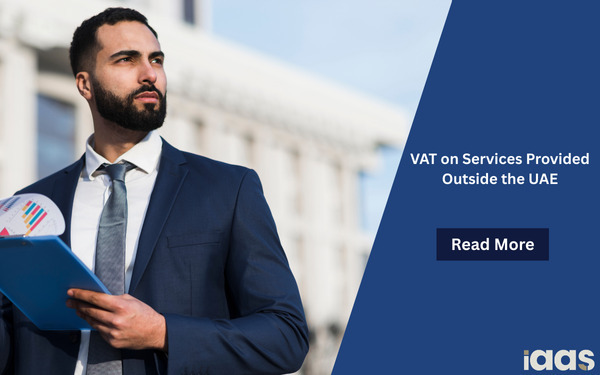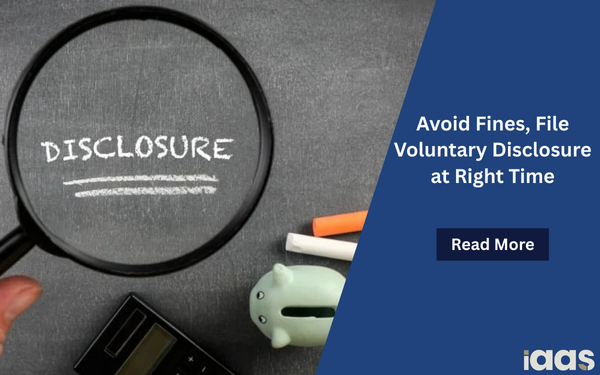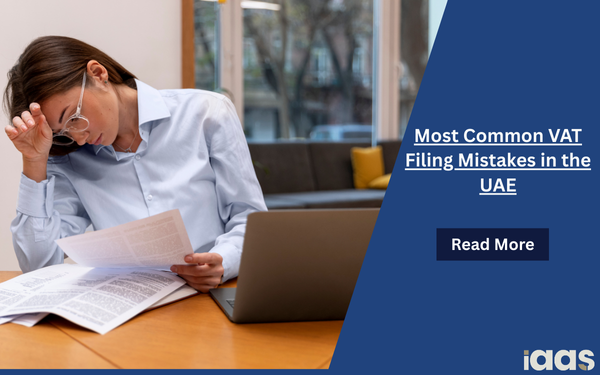VAT on Services Provided Outside the UAE
September 22, 2025

VAT on Services Provided Outside the UAE
When the UAE introduced Value Added Tax (VAT) in January 2018, the standard rate of 5% became applicable on most supplies of goods and services within the country. But when a UAE-based business provides services to clients located outside the UAE, the VAT implications are not always straightforward. Businesses need to apply the rules of place of supply and understand whether the service qualifies for standard-rated VAT (5%), zero-rated VAT (0%), or is considered out of scope for UAE VAT purposes.
This article explores the detailed rules, common scenarios, and compliance requirements for services provided outside the UAE.
- Place of Supply – The Foundation of VAT Treatment
The place of supply concept is central to determining whether a service is subject to UAE VAT. According to the UAE VAT Law:
- If the place of supply is inside the UAE, VAT at 5% generally applies.
- If the place of supply is outside the UAE, the service is usually not subject to UAE VAT.
For services, the place of supply is generally where the recipient of the service is established. However, there are specific rules and exceptions, especially for services connected to real estate, events, or activities physically performed in the UAE.
- Zero-Rated Services (0% VAT)
Services supplied to a recipient located outside the UAE at the time of service may be subject to zero-rating. Zero-rated VAT means that the service provider charges VAT at 0% but can still recover input VAT on related expenses, ensuring competitiveness for UAE businesses in global markets.
Common examples:
- Consultancy and advisory services provided by a UAE firm to an overseas client.
- Legal, accounting, or audit services delivered to an international company with no presence in the UAE.
- IT and software development projects provided remotely to foreign clients.
- Marketing and management support to overseas businesses.
📌 Example: A UAE consultancy provides tax advisory to a client based in Saudi Arabia. Since the recipient is outside the UAE and benefits from the service abroad, the supply qualifies as zero-rated.
- Out-of-Scope Services
If a transaction has no connection to the UAE (neither supplier nor recipient is in the UAE), it is considered out of scope of UAE VAT.
Examples include:
- A UAE business subcontracts work to a consultant in the UK for a client also based in the UK.
- Services provided entirely between two non-UAE parties with no UAE involvement.
These supplies are not reported on the UAE VAT return at all.
- When UAE VAT Still Applies (5% VAT)
Despite dealing with a non-resident client, VAT may still apply in certain circumstances. The Federal Tax Authority (FTA) has clarified that if the service is directly connected to the UAE, VAT at 5% must be charged.
Examples include:
- Real estate services relating to UAE properties (e.g., brokerage, consultancy, or property management).
- Hospitality services such as hotels, catering, or dining provided in the UAE.
- Events, exhibitions, or training sessions physically held in the UAE.
- Passenger or local transport conducted within the UAE.
📌 Example: A property consultancy in Dubai provides valuation services for a villa in Abu Dhabi, even though the client resides in London. Since the service is connected to UAE real estate, VAT at 5% applies.
- Documentation and Compliance
To apply zero-rating or out-of-scope treatment, businesses must maintain robust evidence to support their VAT position. The FTA expects companies to demonstrate that the recipient of the service is outside the UAE.
Best practices:
- Keep contracts and invoices clearly showing the client’s foreign address.
- Maintain proof of recipient location, such as passports, trade licenses, or business registration abroad.
- Ensure the client was outside the UAE at the time of receiving the service.
- Apply the correct VAT treatment consistently in VAT returns.
Failing to maintain proper documentation could result in FTA penalties and reclassification of zero-rated supplies as taxable at 5%.
- Importance for UAE Businesses
Getting VAT right on cross-border services is not just a compliance issue — it has financial and reputational impacts:
- Cash flow management – Zero-rating allows businesses to reclaim input VAT on costs, which improves liquidity.
- Competitiveness – UAE businesses can serve international clients without adding extra VAT costs, making them more attractive.
- Risk reduction – Avoiding incorrect VAT charges or penalties protects businesses from unexpected liabilities.
- Key FTA Guidance
The UAE Federal Tax Authority has issued several clarifications highlighting that:
- Services supplied to a recipient outside the UAE are zero-rated, unless connected to UAE real estate, physical performance in the UAE, or specifically excluded.
- Businesses must always verify the status and location of the recipient.
- Input VAT is fully recoverable on costs related to zero-rated services.
Conclusion
The VAT treatment of services provided outside the UAE depends largely on the place of supply and the nature of the service. While many services qualify as zero-rated when supplied to foreign clients, exceptions exist for services tied to real estate, hospitality, or events within the UAE.
For businesses, the key is documentation, correct classification, and consistent compliance. By applying VAT rules carefully, UAE companies can benefit from zero-rating while staying fully aligned with Federal Tax Authority requirements.
At IAAS Consultancy, we assist businesses in identifying the correct VAT treatment for cross-border services, preparing VAT returns, and ensuring compliance to avoid penalties
Latest Post
Support

Financial Success Made Simple
- +971 54 477 0487
- info@iaasconsultancy.com








